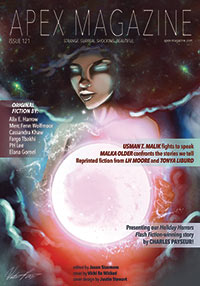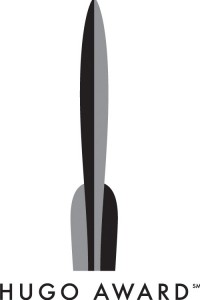Hannu Rajaniemi: Posthuman Utopias

Hannu Jaakko Rajaniemi was born March 9, 1978 in Ylivieska, Finland, ‘‘a small town of about 13,000 people not too far from the Arctic Circle.’’ He lived there until he was 19, then went to study theoretical physics and mathematics at the University of Oulu, graduating with a science BA. He studied math at Cambridge, then returned to Finland to do his national service as a research scientist for the Finnish Defense Forces, and worked at Oulu University on cosmology. He then attended the University of Edinburgh and earned a PhD in string theory.
He lives in Edinburgh, where he is a member of the Writers Bloc spoken-word performance group, which also includes SF writer Charles Stross. A scientist and entrepreneur, Rajaniemi co-founded the ThinkTank Maths research firm in 2006, leaving the company in 2012. He has also worked with Singularity University, an organization devoted to using cutting-edge science to address major global problems.
Rajaniemi’s first SF story was ‘‘Deus Ex Homine’’ (2005). Other notable short works include Theodore Sturgeon Memorial Award finalist ‘‘His Master’s Voice’’ (2008) and SF&F Translation Award winner ‘‘Elegy for a Young Elk’’ (2010, first published in Finnish in 2007, translated by Rajaniemi). A collection of linked fantasies were published as Worlds of Birth and Death (2006).
His debut novel The Quantum Thief (2011) was a John W. Campbell Memorial Award finalist, and began the Jean de Flambeur series, about a gentleman thief in a posthuman future. The series continued with Campbell Award finalist The Fractal Prince (2012) and concluded with The Causal Angel (2014). He has three standalone novels forthcoming from Gollancz.
Excerpts from the interview:
‘‘The Jean le Flambeur books have a few different inspirations. I encountered the work of Maurice Leblanc between ages eight and ten, which was my voracious reading period at the local public library in my home town. Besides the Sherlock Holmes stories, my favourite books were the Arséne Lupin books by Leblanc, which were translated into Finnish. There was a period around when I first moved to Edinburgh when I was interested in these post-singularity, posthuman ideas. Some sort of connection clicked. First of all, I read a book by Robert Axelrod called The Evolution of Cooperation, which is all about the prisoner’s dilemma, and how it turns out that certain kinds of altruistic strategies have something of an advantage. I started thinking, ‘Okay, what if there was a posthuman prison that tried to exploit that phenomenon by having this enormously large-scale simulated prisoner’s dilemma game, where prisoners would go through multiple iterations and evolve towards becoming altruistic cooperators?’ I started wondering what sort of criminals would be in the prison. Because I wanted a sympathetic character, I came back to Leblanc and his Arsène Lupin. I started thinking about Arsène Lupin in a bit more depth and realised that he’s, in a way, a posthuman. In the sense that Arsène Lupin is not his real name, it’s an identity he’s created for himself. He’s kind of superhuman in the Sherlock Holmes way, but what I’m referring to more is that in the Leblanc books he goes through one transformation after another. He assumes all these different identities. Across the course of the LeBlanc books he must have over a hundred pseudonyms of various kinds, including disguising himself at one point as the head of the police unit that investigates himself. He’s not a psychopath like his contemporary Fantomas, he’s a sympathetic character, but he does harm people by entangling them in his schemes, and it does tend to have negative results for his loved ones. When one of these schemes goes wrong and people get hurt he tries some sort of redemption, he joins the French Foreign Legion or tries to retire from a life of crime, but ends up always being trapped by the Arsène Lupin persona. Sherlock Holmes likes to describe himself as a cold inhuman thinking machine, although of course he’s not. The Lupin connection is that I started thinking about what these posthuman transformations would be like when you can edit your memories and change yourself at a much deeper level.”
…
“I read old science fiction like Verne and H.G. Wells before I read Asimov. That was also a function of what was available in Finland. Finland, for a small language group, has the benefit of quite a few translators who are very dedicated, and I’m quite happy with my Finnish translations. (I write in English.) I read Verne, Wells, Asimov, and some of the other ones that were available at the time. And Olaf Stapledon: there was a Finnish translation of Last and First Men that left a huge impression on me. Stapledon has these brain towers, for example, that engineer the next generation of human beings. I recently reread The Star Maker and I was just completely blown away. It’s an astonishing book. You can think of the universe itself as a character, ultimately. As I was getting to my teens and starting to know English a little bit better I started into Heinlein and the other classics, and Zelazny quite early on was an influence as well.”
…
‘‘I’ve always wanted to write a post-collapse story. I don’t like the way most of them are done – they’re just terrible cataclysms of disaster. We got used to this approach in The Road or The Parable of the Sower. I feel that’s a betrayal of the reality of the world and what human beings can do. In so many of these stories, within a few chapters you’ve got feral children roasting body parts by the side of the road. I’m trying to write a post-collapse story that feels more hopeful. When I was a kid I was struck by Engine Summer, which is far future but has a lovely lightness to it, even though you can see the character is living in the remnants of the modern world.
…
‘‘I’m really drawn to the intersection of mathematics and physics. Mathematics has this strange power to describe how the universe works even though it is an abstract set of concepts that can be created independently of the physical world. Doing my PhD, I teamed up with a friend of mine, Sam Halliday, who was also doing a PhD in string theory. We both realized that string theory wasn’t what we wanted to do. We wanted to explore this connection between mathematics and the real world. People we really admired were Alan Turing and John Von Neumann, who came from pure mathematical backgrounds but were able to tackle real-world problems. We started a company to do that called ThinkTank Maths, that basically specialized in solving industrial mathematics problems. We ended up doing a lot of work for Motorola, the European Space Agency, the BBC, the Royal Bank of Scotland, the UK Ministry of Defense, and other organizations like that. That was a big part of my life for seven years.”
…
‘‘Real science is an infinite source of fascinating ideas. You can come up with these interesting connections: the very reason the first book is called The Quantum Thief is that I started wondering what a futuristic gentleman thief would actually steal in a post-scarcity society. What is there to be stolen? Then I realized that quantum information can’t be copied. There’s something called the no-clone theorem in quantum mechanics stating that a quantum state can never be perfectly duplicated. If you try, you end up destroying it. Quantum information could potentially be a finite resource that could be valuable. And that’s also where the Zoku came from: the idea that their scarce resource is shared entanglement. I certainly want to leave that world alone for a while. Maybe not forever. There are many stories to be told in that universe but I think the themes I wanted to explore are so much projected into the structure of the universe that once I’ve dealt with those themes, I’m ready to move on. I have various short story ideas I’d like to explore at some point, other parts of that world that haven’t been shown in the books. But at the moment I’m working on completely different things and it feels quite exciting. I would like to write more short fiction, but time doesn’t really allow.”
…
‘‘I have a further three book contract with Gollancz, It won’t be a trilogy, but three standalone books which will all be quite different. I’m working on the first one right now. It doesn’t have a proper title yet. It is going to be an alternate history. I like to describe the genre as ectopunk, as in ectoplasm and steampunk, although it’s not really steampunk. I guess in the same way as the spacesuit story, I’ve found a very rich seam of historical facts from the 19th century, especially regarding the evolution of spiritualism and how it wasn’t just this pseudo-religious movement, but was also a theme of the thinking of 19th-century scientists, and how it sort of interacted with Darwin’s theory of evolution. Mathematicians got engaged with it and started speculating about the fourth dimension and the ether and the afterlife. There are fascinating historical characters.”






